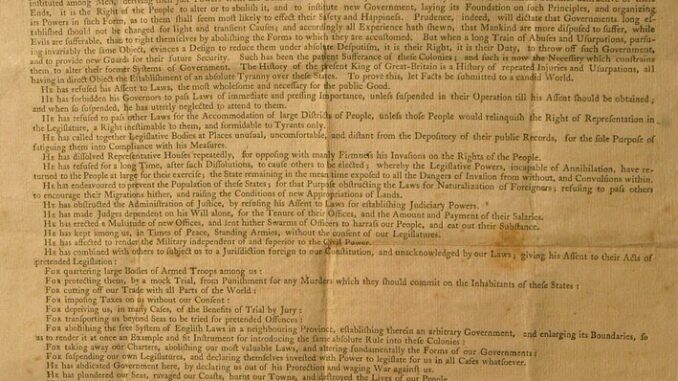
Freedom of expression and competition among a very few extraordinary people are at the heart of major advancements in human history. When both are allowed to flourish, everyone benefits. When either one, or both, are suppressed in any way for any individual, we all suffer the consequences.
I have always been amazed that a handful of extraordinarily smart and educated American colonists, about 55 or so, “just happened” to be alive at the same time in history. They “just happened” to have similar educations to be able to concoct two of the greatest civic documents in world history, the Declaration of Independence and the US Constitution in eleven years, 1776 to 1787.
They fought like cats and dogs over those ideas. Aaron Burr killed Alexander Hamilton, remember?
Was it pure luck? Providence? Why didn’t it happen earlier in mankind’s history? Why did American freedom happen over the span of about fifty years in the latter part of the 18th century and not in, say, China under the Ming Dynasty or in Egypt under the Pharaohs?
It didn’t “just happen.” The American Democratic Republican Experiment still unfolding was founded upon two epochal periods of free thought and competition of ideas long ago. It can be snuffed out in a moment if Americans allow progressive socialist Democrats on the left to close free and open debate as tyrants did in the past.
From the middle of the fourth century B.C. to the third, a small number of curious, free-thinking intellectuals “just happened” to be alive in ancient Athens who thought broadly and deeply about life in general. Socrates, a man not of noble birth, gained notoriety for his penetrating inquiries and thoughts into the nature of what constituted a virtuous life.
His pupil, Plato and later disciple, Aristotle left behind books on politics, ethics and philosophy that still shape young minds of students wherever schools allow them to be taught nowadays.
The Greeks had thrown off tyrannical dictatorial rule so they could live in an environment which encouraged free thought, an intense curiosity and discussion, not cancellation or banishment. The Greeks were seekers of truth, the very definition of philosophy.
In one of the saddest quirks of history, Socrates was the only person to be sentenced to death in Athens for freely expressing his views. A short reign of tyrannical rule returned to Athens in 399 BC and he was convicted of corrupting the youth of Athens.
His crime? He told them there was a monotheistic God as opposed to the myriad of Greek gods Athenians had long worshiped.
The greatest philosophical mind in human history was silenced by a group of prejudiced, small-minded people who did not like his views on religion.
What a tragic tradeoff. It could be happening today in America.
In Florence, Italy eighteen centuries later, architect Filippo Brunelleschi went to Rome to dig through the ruins of the once pre-eminent Roman Empire to discover how they built such magnificent temples with domes. With architectural and artistic discoveries brought back by other Florentines, Florence became the intellectual and culture cauldron of innovation for the next century.
Brunelleschi literally and figuratively fought with church authorities and his architect competition. The artists, inventors and writers who came after him also fought and disagreed with their competitors ― Leonardo da Vinci, Michelangelo, Donatello, Raphael, Galileo and Dante Alighieri of “The Divine Comedy/Inferno” fame.
Michelangelo at a young age suffered a broken nose when a fellow student, jealous of his enormous talent, punched him in the face when Michelangelo would not stop teasing him, most likely criticizing his lesser work. True artists can be temperamental.
Galileo was eventually brought to trial by Catholic Church authorities for saying the sun was the center of the universe, not the earth. He was threatened with being burned at the stake if he didn’t recant. He recanted. However, his writings were already circulating in the public and open-minded smart people saw the truth in his discoveries and forced the Catholic Church to recant their position.
Competition, curiosity and free expression made the Florentines great. None of them were held back by school systems in the hopes of equity of outcome. All of them had mentors and teachers who pushed them to great achievement and excellence.
Free speech and competition of ideas are the lifeblood of American exceptionalism. If we lose them to the thought police on the left, America will one day wind up as a blip in the history books beside ancient Athens and the Italian Renaissance in Florence long ago.



